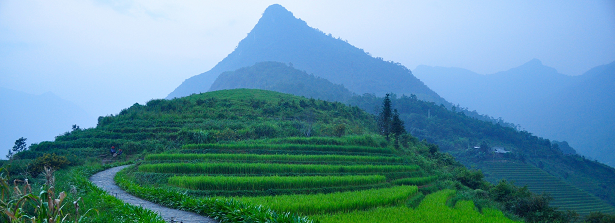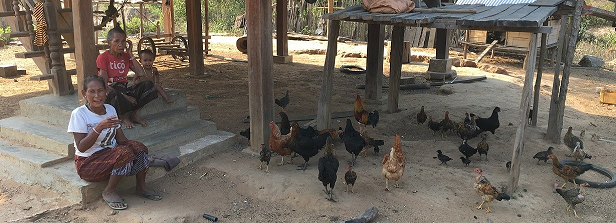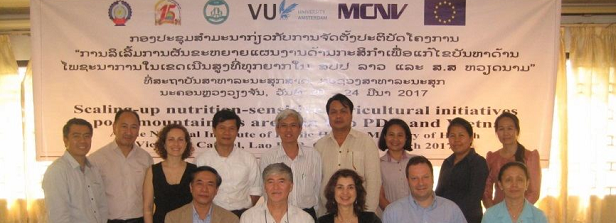Scaling-up nutrition-sensitive agricultural initiatives in Vietnam and Lao PDR

Duration: September 01, 2016 – September 01, 2020
Project information
Food insecurity and malnutrition remain persistent challenges among upland populations in Asia. Interventions are often fragmented and address immediate rather than underlying causes. Nutrition-Sensitive Agriculture (NSA) is a relatively new inter-sectoral, multi-level food system approach aiming to maximise agriculture’s contribution to improved food security and nutrition.
Aim: Building upon existing interventions in Vietnam and Lao PDR this project aims to generate evidence on the effectiveness of, and potential and best way to implement and scale-up, nutrition-sensitive agriculture (NSA) amongst ethnic minorities in mountainous areas. As such it aims to contribute to improved food security and reduced malnutrition and poverty.
Objectives: Direct objectives of the project are to:
- Identify effective NSA interventions that improve food security and reduce malnutrition and poverty.
- Construct a generic framework and guidelines for developing, replicating and scaling-up of effective NSA interventions based on a cross-country, multi-level analysis of the barriers and facilitators in existing cases.
- Disseminate lessons learned to policy-makers, NGOs, scientific community, local communities and private sector.
Method: The project utilizes Complex Adaptive System Theory and Transition Management to analyse processes of embedding NSA interventions in food systems. A transdisciplinary research methodology is used to assess effectiveness and enhance adaptive and transformational capacities of studied interventions. Comparative case study analysis results in a generic framework to develop and scale-up NSA interventions in different contexts. Lessons learned advise a wide variety of stakeholders to address food security and malnutrition of vulnerable populations.
Countries: Vietnam and Lao PDR.
Dutch policy goal: Sustainable food systems.
Progress reports
Year 1: The NSA project aims, through its transdisciplinary research, to generate evidence on the effectiveness of, and best way to scale-up NSA amongst ethnic minorities in mountainous areas. The work has started in December 2016 with much enthusiasm and commitment of all parties. Activities during the first 10 months were mainly of an exploratory and preparatory nature, including the kick-off meeting in March, exploratory interviews, development of four PhD proposals, a retrospective study in Vietnam, and preparation for the baseline survey and qualitative in-depth studies in Nong District, Laos PDR. This means that no research outcomes can be reported as yet. During the next three years, the NSA-project will team up with the interventions developed within the framework of the newly started CANTEEN and AFAS projects on food and nutrition security.
Summary mid-term review: Insights from the qualitative and quantitative baseline and retrospective studies conducted in the past year confirm the severity and complexity of food and nutrition insecurity among upland, remote populations in Vietnam and Laos. Together with stakeholders, and based on insights from our studies and the broader literature, the research team has developed context-specific, multi-component and multi-sectoral interventions for both Laos and Vietnam. Community groups, local governments from education, agriculture and health participated in the design and selection of interventions. In both countries the interventions are implemented and monitored (Vietnam since January 2018; Laos since August 2018). For example, in Vietnam social entrepreneurship initiatives are undertaken to provide nutritious porridge in nursery schools. In Laos school education programs utilizing newly set-up school gardens are among the first interventions piloted. The potential for horizontal and vertical scaling up in both Vietnam and Laos is the ultimate objective of this project. In Vietnam, together with the local government, a legal framework for scaling up of NSA will be developed. In Laos, the new projects directly allow for horizontal scaling and promising collaboration with governments will contribute to vertical scaling.


